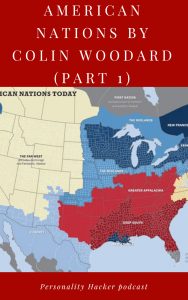Download Episode Here – right click link and select “Save Link As…”
In this episode, Joel and Antonia talk about the book American Nations by author Colin Woodard and how seeing North America through this lens could be another access point for healthy dialog.

To subscribe to the podcast, please use the links below:
Subscribe with iTunes
Non-iTunes Link
Download The Android App
Subscribe on Soundcloud
Subscribe with Stitcher
Subscribe on Google Play
Subscribe with Facebook Messenger
If you like the podcast and want to help us out in return, please leave an honest rating and review on iTunes by clicking here. It will help the show and its ranking in iTunes immensely! We would be eternally grateful!
Want to learn more?
Discover Your Personal Genius
We want to hear from you. Leave your comments below…


Share:
Podcast - Episode 0251 - Is Growing Your Copilot Even Worth It?
Podcast - Episode 0253 - American Nations by Colin Woodard (Part 2)
15 comments
I ran across your podcast. I have used this book as a book discussion twice and plan to do it again. The book is in my top 10 but, I have added 10 more nations to make America complete.
(Native Indians) first people that came to the Americans thousands of years ago and today face challenges of nearly complete loss of its original cultures.
Alaska (Russian)
Newfoundland (British)
Hawaii (Polynesian)
Canada (British)
Central America (Spanish)
Central and Southern Mexico (Spanish)
(African Americans) the largest racial group that have lived in and impacted many nations. Spanish Caribbean
South Florida (Spanish Caribbean)
Adding these Nations gives more clarity to how the other Nations evolved over time.
Great discussion! In regards to your comments on the two slave cultures, many Tidewater slave owners moved to the South, including SC’s first governor, Richard Richardson. I’m sure this adds to the varying experiences of slave treatment throughout the south. Oddly enough, it was the Virginian law adopted by South Carolina mandating slavery as a hereditary condition that only added to the division between races.
Really enjoyed your presentation of American Nations. Not only did it give me some knowledge on North American social anthropology and geography (which for a non-American is quite valuable), it made me think about where personality typology and culture meet and/or overlap, which is something I’ve also given a lot of thought on (i.e. does an extraverted person who’s grown up in an introverted culture e.g. Nordic nations/Finland resemble an introverted person who’s grown up in an extraverted culture e.g. Mediterranean countries, and in what ways?)
Please do more episodes on books like this!
Definitely. It’s not uncommon for people who don’t resonate with the culture in which they were raised to move to an area that suits them more. Woodard mentions in the introduction of American Nations that this has become a more common phenomenon and is described in the book “The Big Sort.”
A
Is it possible to associate with a culture outside of one’s physical geographic location? How might this occur? (making friends of a different group, perhaps?)
I don’t resonate very much with the cultures in my area, but do see how they have had an impact on family and their values. I live at the intersection of El Norte, Greater Appalachia, and the Deep South. Out of these, I think I fit most into the El Norte group, but Midlands values are more aligned with my own.